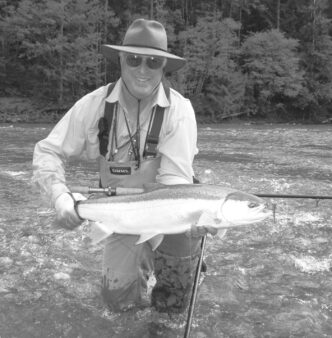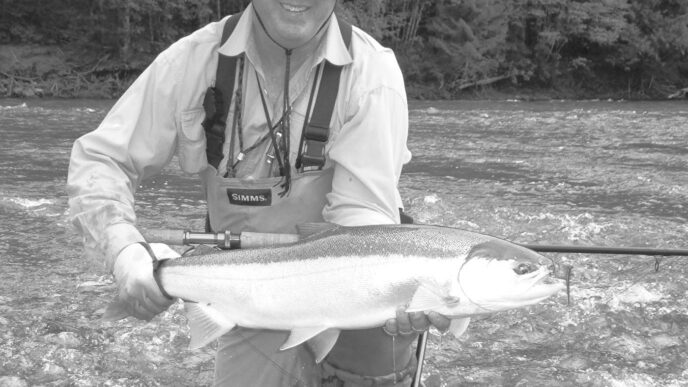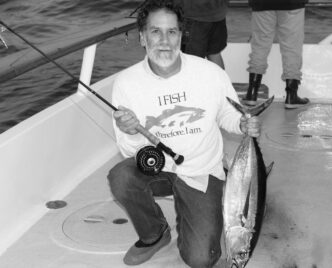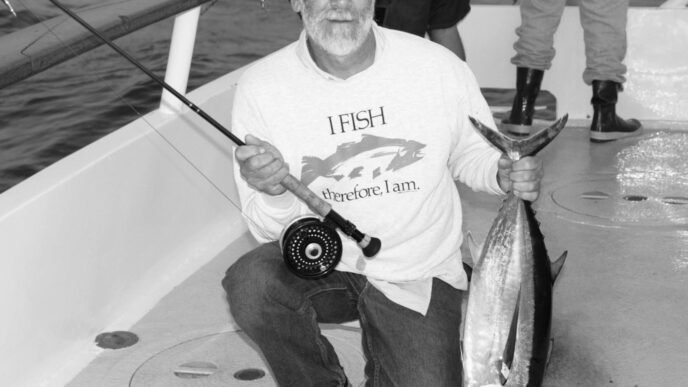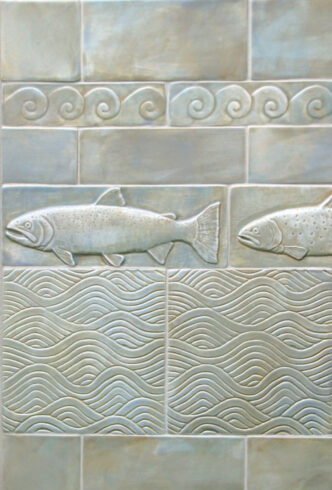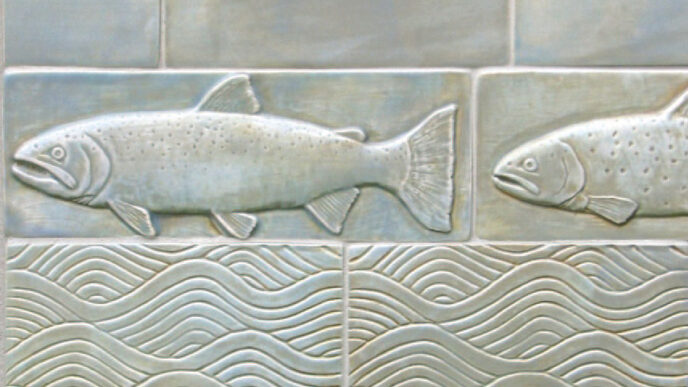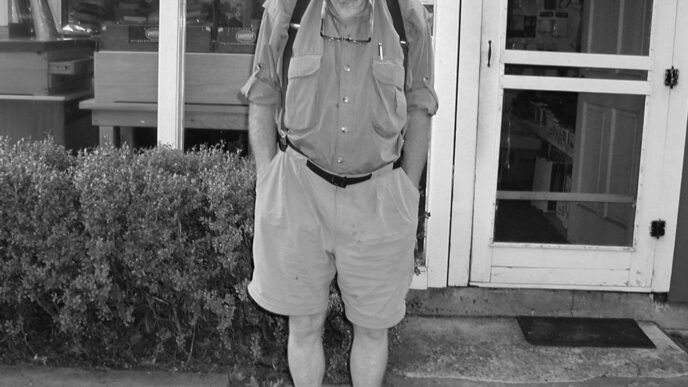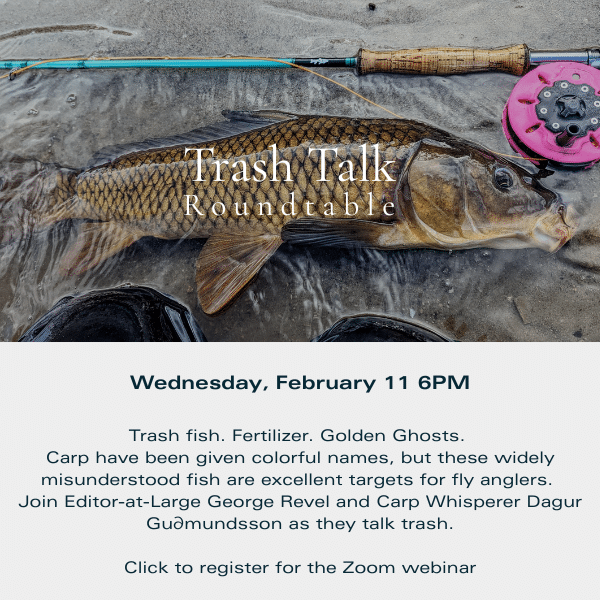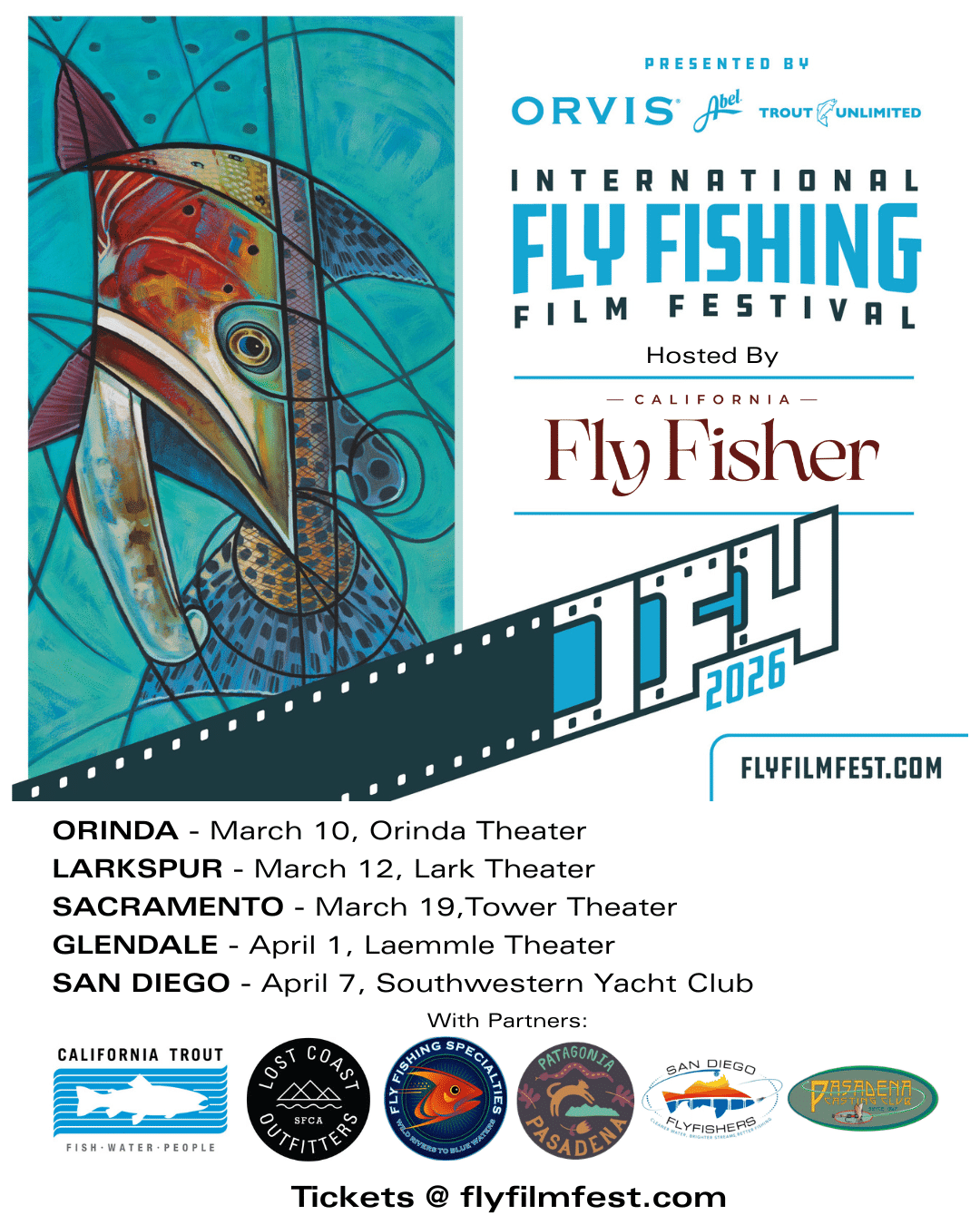Unless memory fails me, and it does, the last time I built a column of short pieces, I introduced it with an ode to “three-dot journalism.” Back then, every NorCal fly fisher knew this referred to Herb Caen, a gentle gentleman-writer who coined the term “beatnik” circa 1958, popularized “hippie” in 1967, and was buried with fireworks thirty years later. Fireworks, literally — one of Francisco’s greatest funeral celebrations.
I tapped Caen because he knew that not every story’s a big one . . . that a few paragraphs were often enough, or even a few sentences . . . when set off by his famous “three-dot” ellipses . . .
I can’t manage that, but I will turn a trio here . . .
You Will Die: All a Fisher Needs to Know about Cold-Weather Angling
First, while smart writers try to slip this in late in a column, I don’t want to forget a caution I’m moved to issue again, motivated mainly by catastrophes I’ve watched befall friends. In fact, the unofficial California Fly Fisher campaign slogan for winter fishing is this, or should be:
“Friends don’t let friends fish brain-dead.” To wit:
Anglers who fall into frigid water often emerge hypothermic — if they emerge — especially if they submerge completely. But I’m convinced many spill because hypothermia has already chilled body and brain. First, you go dim, get sluggy, start making bad decisions and worse moves.
Then you plunk.
The distinction’s not quite academic.
While after might be a matter of a degree — a lot of degrees — recognizing preplunk symptoms might help you avoid far more serious exposure. That’s the theory, anyway. In practice, I’m afraid, prevention takes more forethought than we’re wont to employ, enjoying ourselves toward oblivion. Thus this column, beginning with the obligatory caveat that immediately follows. None of these cautions apply to experienced, well-prepared, and wise winter anglers, especially hard-core steelheaders. Unless, of course, prefacing “winter anglers” with “wise” is a suspect juxtaposition. I’d rather not take sides on that issue.
But as for the rest of us . . .
We dream in winter. Good gifts in December create awful yearnings. We begin to fret. And then — we know it’s wrong — we being to schedule and scheme, chisel time for an outing from the icy block of the New Year. When we can . . . We seize the moment. And from that moment we also steel ourselves. We must be stoical, sure, to brave elements for that chance at fish, or perhaps just a chance that we might have a chance, if you know what I mean. We’ll suffer, despite our best efforts to prepare. It will be worth it. And if any fool thinks we might fade fast when we get to the water, he or she has no clue what it’s like to be a fishing fool.
And then . . .
Oh, we have a good hour, even a great one. Hook fish, maybe. But just to be on the water again, in woods, wildness, out of a life too tightly bound . . .
We walk, we wade; we’re casting, taking deep breaths. You’ve been there: by that second hour, you can feel your stiff arm starting to stretch, your gloved hand befriending the grip. You thrill to the way your shoulder senses the rod loading, as if the line’s a length of your own sinew. You answer this sweet, strong pull, swelling with power you translate to speed, from speed into flight . . .
Cold? What cold? Cold? No. Not really.
Cold? Oh . . . well, maybe my feet. Cold? Sure, but who cares, right?
Uh-huh.
First we shake off shivers — an early symptom. I’ve met only one adult angler who takes these seriously and a least dozen who will say, to themselves or to a shivering spouse, “Double-haul and you’ll stay warm.” Blythe spirits are we, optimists all — which helps explain why we disdain to worry about the “muscle miscoordination” that follows. “What’s a stumble or two, at my age?” quoth we, figuring that, if we’re no longer nimble, at least we’re still tough. Besides, “If I were in better shape, and these boots were new with diamond studs and that Instagrip Crepuscular Adhesion . . .” Then, as these illusions melt, comes the first, only moderately plaintive “I can stand this, because when’s the next time I’ll get fishing?”
Wait a while, and that last question will sound like this: “Whenth tha neth time I-ullll geth fithing?” Not to worry. According to one source, your symptoms are only “moderate” when you start slurring like that, even as you find yourself more or less “mildly confused.” And here’s something: as speech gets Daffy and movements “increasingly slow and labored,” you may “still appear alert,” at least to somebody roughly as chilled as you are.
You know that somebody. The guy on your left — looks vaguely familiar? Who’s just asked you politely where he left his truck; and then, cheerfully, “Isss tha that plath we f-f — ford-did tha rifffferr? O’rrr by da big twee?”
(Remember that, dim as you are, this may sound pretty good, as a random collection of sounds or — possibly! — part of a Herman’s Hermits song you thought you’d forgotten.)
Of course, your partner’s condition doesn’t necessarily reflect yours. His gear and conditioning might be better. He might have topped off with more fluids and fuel. Perhaps he has, over the years, cleverly insulated himself with great slabs of fat. Then again, the opposite might be true: your pal or pal-ette could be suffering more than you know. If she forgot her water bottle, for example, if her waders leak and she’s been wet since first light, but has kept these secrets for fear of shortchanging your trip?
If that’s the case, propose on the spot, if you haven’t already, but understand that by suppertime, she won’t know your name. Then there’s another possibility: Remember the dog in Jack London’s “To Build a Fire?” The one who knew his master was making a mistake, heading for the claim at 50 degrees below? How he slunk along, hardly a woof of warning before it was “sleepy time” for both?
Reader, now’s the time to insist this doesn’t have to happen. And let’s just say I do insist here, to jump us back to preparation.
Surely, we’re all versed. We’ve read the advisories about layering, wicking. We choose wool or synthetics, avoid cotton, and some have invested tax returns in astonishing fibers that will, truly, keep us warmer than anything that’s ever come before. We know we’re not allowed to sweat, at all, and won’t, because we’ll never let ourselves get exhausted while walking around so bundled up our arms can’t find elbows and our legs wonder where we left the knees. For sure, we keep our heads warm, except maybe that front side now going dead to the touch, and who ever gets a hand wet while fishing? We’re drinking water or juices not yet fermented.
All thif f twue. I have confidence in that.
Of course, I’m also confident that a steelheader I fished with three winters back followed all the cautions sited above, and yet . . .
And yet . . .he was so far gone before he cannonballed that ten shouts of “Don’t go that way!” had all the impact of frost fumes. I remember how gaily he waved as he staggered, mumbling . . . how high he raised his hand as he toppled, went under, began tumbling in the current . . .
How wild he went as a guide and I dragged him to shore, sodden as a Hare’s Ear, thrashing insanely, babbling something through blue lips.
Luckily, the truck was only a hundred yards away that time. Ditto a time before that, when my most savvy, water-wise friend stood up in the bow of my tiny boat after a frigid three-hour drift. We were four feet away from the frozen dock when he suddenly said “I can do this” — and jumped.
He was wrong.
Perhaps you’re expecting now another checklist, amplifying caveats already noted. But just for the fun of it, let’s face a few facts this time:
If great preparation and gear aren’t always enough . . .
If you can’t trust your own judgment, eroding slowly in a process you, and a partner, might easily miss . . .
If you can’t trust that friend’s judgment, as assessed by your failing brain . . .
Where does that leave you?
The obvious answer is just pure common sense: fish in really, really cold weather and eventually you will die.
Also. . . anglers? Carry aspirin. Cold and exertion can prompt heart attacks, and a couple hits of Saint Bob’s Salicylic Baby Bits might save your life. In any case, aspirin will make whatever happens next a little less painful.
For the record, not all lunatic fishers drown or freeze to death or keel over every trip. For that reason, you might wish to add special insurance policies to your updated will. Something that can help out when the loss of frostbitten limbs, lips, nose, ears, and eyelids permanently alter a career trajectory.
And there’s this: time, fellow anglers. When challenging the elements, time spent exposed is your worst enemy, keeping track your only hope. I tried to find a chart that, factoring in half a dozen of a hundred variables, would give you a “safe” range of time in which to play, but no luck. So . . .
Keep in mind that you’re not going out for “a day” of fishing, but for bursts of a few hours — sometimes just one — sandwiched between periods of rewarming, refueling, rehydration, and rehabilitation. Before each expedition, set the timer on your watch, also on your cell phone, if you carry one. Make sure your partner does the same. Hope that when the chimes go off, at least one of you remembers why you had set them.
Of course, that means don’t fish alone. And remember: Friends don’t let friends fish brain-dead.
A Fly-Fisher’s Guide to Next Year’s Gift-Getting
By the time this hits print, seventy kajillion anglers will have added new pieces of Christmas kitsch to a pile they keep hidden in a closet or box. Among this litter, most will find a macrocephalic trout with pronounced carp lips, ceramic or plastic, often fixed onto plaques, coffee mugs, tie tacks, and belt buckles or molded into the handle of all-purpose fishing tools stamped from pot metal. Other likely candidates for this cache: mechanical spinners that don’t, gifted to fly fishers who won’t, and T-shirts (Lord, the T-shirts) silkscreened with puns that were dead on arrival and still, somehow, seduce in-laws into thinking that “I’m a Master Baiter” is something a Dad or Mom or any sentient being would be proud to wear on chest or breast. Some of these prizes were presented as Hanukkah gelt, and I presume there’s also Kwanzaa fishing kibble, though what Googled to this topic were tarpon adventures on an Angolan river, including trips outfitted by somebody named “Aardvark McLeod.”
Point is . . . that all of these gifts came wrapped in wishes well intended. And all, I trust, were embraced by recipients — you, I mean — whose smiles acknowledged this.
But . . . just in case?
This magazine will now help you make it stop.
I’ve been opening instant white elephants for almost five decades. Don’t tell anybody — I mean that — but for last forty years, not every wide grin has been entirely sincere, except those prompted by “Do you like it, Daddy?” In particular, and for reasons unknown, those carp-lipped trout bother me a lot. Surely, there’s one decent Salmo photo somewhere in China? I know, and you will too, that this angst is my fault entirely. I’ve never left a catalog out in some conspicuous place, urged anybody to ask at fly shop or search the Internet. I’ve probably answered a hundred “What do really want?” queries with “Nothing, really, I’m good” or — far worse, apparently — a heartfelt request for “warm socks.” (Why does nobody believe this?) My fault, all my fault . . . unless it’s also a fault of yours.
In case that’s the case?
The editor and I both trust you save this magazine, every single one. Goes without saying, really; so here’s an idea.
Put a Post-It right where your right thumb’s pressing this page right now. Finish this column (please), which ends the issue. File with the others collected in your gold-embossed, calf-leather, ebony-andivory-inlaid, velvet-lined California Fly Fisher case.
Then forget it for ten months. Next November, extract it from hiding. (Personally, I’d take a moment to underline the “carp lip” riff.) Slip a note, list, or catalog between the last page and the cover, then add Post-Its beside adverts for shops, products, lodges, or guides.
If you get what you want, we helped. Renew. Ditto if you don’t get what you didn’t want. And if somebody still delivers a macrocephalic slug-lipped abomination? Hurt them. Unless it’s a child or somebody really old. Even with these folks, show canines when you force that smile.
Fly fishers, make it stop.
Ghosts of a Winter Past
Another winter memory: the San Francisco Orvis store, circa 1997, when it was managed by the lovely Cheryl Johnson and manned in the upstairs fly-fishing realm mostly by Dan Gracia.
I’d bet eyeteeth that many readers recall both of them fondly. And so I dedicate this to Cheryl and Dan, and although it is, for the record, an entirely fictional memory,I will use their real names by way of exploiting this affection in a happy, post-holiday way. And you know, really it could have happened like this:
Although otherwise a reasonable person, the character I call “Dan” was an early fan of this magazine and of these “Meanders.” Just how much a fan of the latter I did not know until he called me, San Francisco to Oakland, near the end of that 1997 December’s third week. And when he told me how many books he had on his shelves with Meanders in the title, the real me gasped.
“How many?”
“Quite a few, isn’t it?” said Dan. But the short laugh that followed sounded, well, uneasy — odd, since Dan in fact and this fiction was ever flush with faith, fun, and good will. “Quite a few, really, yes. . . . So, I was just wondering . . . if you might be able to come in and sign a few. A book signing, I mean, here at the store.”
The book was just out: I’d never done one. “Well . . . sure. When?”
“Oh. You know, tomorrow would be good. From before lunchtime, let’s say, until two or three?”
For some reason, I’d imagined these events came with, oh . . . notice or something. But what did I know?
I took BART. I sat by a heating vent to dry out the gray tweed sport coat I’d just steamed limp in the shower. Found the store, no problem, and there met Dan, who introduced me to Cheryl. A lovely woman, as noted: petite, with a brilliant smile I wouldn’t see for a while and a gaze that at rare moments might fix you in place about as firmly as an average-length whaling harpoon.
“Hello,” she said softly, examining my tweedy, but limp attire. And softly she continued, employing ellipses in a fashion I know Caen would have admired. “Do you know . . . I have thirty-five copies of your book on my shelves?”
“Really? Ah. Well . . .”
“Thirty . . .five,” she repeated and glanced at Dan.
Pause here. Let’s say you occasionally wonder how a thirty-five-pound wolverine looks, facing off a grizzly across a frozen caribou’s carcass.
Now, if Dan’s the caribou, and I’m small-bearish, wearing steamed tweed . . . Cheryl would not have looked like a wolverine — not possible. She would have appeared calm, polite, nicely dressed, and, frankly, a delight to eye. And yet . . .
I swear, I would have hated to surrender Dan’s body without some kind of protest . . . a small blatting sound or stern snuffle, perhaps a semiceramic, carplipped smile. I mean, I would have hated to give him up without any noise at all. And yet . . .
The two of us boys tripped silently up the stairs. We both snuck glances down, then slipped around a coat rack. “I think,” Dan whispered, “I think . . . Cheryl thinks . . . thirty-five is maybe a lot.”
They looked that way to me, too, when I saw all the copies stacked up on a table more or less in the middle of things. As to Dan’s look, well . . .
I edged up on the mountain. “So . . . I guess I should stand right … about here?” “That would be fine,” said Dan a tad glumly. “You have a pen, I imagine?”
“Yeah. Yes, I do.” Then, after a small silence, “A good pen. Really.”
Dan nodded. “Well . . . then I guess I better make sure the announcement board’s in the right place. I mean, I wish we’d actually had time to advertise, but…”
“Yeah. Oh well.”
That conversation was the fast part of the next hour.
But . . . then? How can I ever forget?
I’m sure every author remembers his first sale at his first-ever book signing. I know I do: waders, the new breathables, I think, to a woman on her way to Alaska. Purely beginner’s luck that the first pair she tried on fit like a glove, or at least two fingers and a palm. Not quite what I’d expected to be doing, but when she waved and said, “Can you help me here?” what was I supposed to do?
My second sale beat that flat: a watch. I had to borrow a key to open the display so I could read its nifty features off the box. But I read with feeling, mind you, and another satisfied customer tripped off to the counter. “Are you sure you want to do this?” asked Dan, after a clerk alerted him to my triumph.
“What?” I hissed. “I’m not on commission?”
I followed with several saltwater salmon streamers, also for a customer Alaska bound, to fish an area in a season I actually knew something about.
I sold another watch: this part is true. And soon after, I accepted, with grace and regret, an “I’ll be back” on a second set of waders. But was I worried? What with the lunch crowd now arriving en mass? No way. I was on a roll. Somewhere among those folks, I knew, was my third watch.
Accidents happen, of course. Distractions: out of the blue, a fair young woman — small medium, I was thinking, a lightgreen band, roman numerals — asked “Excuse me, what are all those?”
I turned, following the stare of dewy eyes . . .
“Those? Oh. Books,” I said. And because my watch roll had braked, “A book, I mean. One book, many copies . . . thirty-five, I’ve heard.”
“Uh-huh,” she said. Then, after an expectant ellipsis, “…why are they all out here?”
“Well . . . I wrote them. It.”
“Really,” she said, in a way that, at minimum, expressed grave reservations. “I thought you worked here?”
“No. Not really. I mean, I can if you need waders fitted. But . . .no, not really.”
For a moment I saw a pale wolverine stare. This faded, luckily, and her expression suggested that she had recognized my disabilities.
“O-kaaay,” she said slowly. “Well . . . I’m looking for something for my father. My Dad? Also for my brother. They fly fish together. So I’ll just go over —”
“Your father?” chirped I, as if surprised she had one. But now I was reenergized. “You know, I wrote about my father in some of these stories . . .”
I read her a little. She bought a copy. So did a couple that was listening nearby, waiting to check out. I signed one, maybe two more of the thirty-three copies remaining during the next hour or two. I was truly hoping to get down to twenty-nine, but I don’t think I did so, unless Dan bought one on the sly.
And to Dan, around three, I said goodbye. I also said “Sorry” several times. He didn’t look quite as disappointed as I thought he should, though. “Cheryl wants to talk to you,” he said.
“Oh. Oh great. And I bet there’s no back way out of here, right?”
Right.
Cheryl asked me to step into a small office. I agreed, reluctantly. However bearish, I remained unarmed, not counting the good pen, and this time there would be no Dan to take heat.
“You sold watches,” she said softly, without actually saying what she meant, as in “You stole them.”
“Yes. Yes I did. But —”
“Two watches. And you actually fitted people for waders?”
“No. I mean, the first woman, I didn’t fit her, really. They just fit by themselves. And I never touched her, I swear.”
“You . . . well that’s . . . fine. Now I’m sorry to ask you this, but are you really a fishing writer?”
“I am,” I said, sounding tentative and plaintive, even to me. For a moment, I even had the bizarre feeling that we both knew I was lying.
Cheryl nodded. “I see. Well, I don’t think I expected that. Would you . . . like a cup of coffee?”
I knew it was a trick right away, of course. But I couldn’t just then imagine how an innocent, real fishing author would answer. I also hadn’t had breakfast yet, and truth to tell, couldn’t quite unpin myself from those eyes — an old carcajou trick, I believe.
“Also,” said Cheryl, “and I’m quite serious this . . . would you like a job?”
I’m afraid I expelled a little coffee as I choked on an ellipsis.
Riding home on BART, I felt warm enough to go fishing and extrapleased at how little my new stain showed on dark tweed.
(For the record: while I don’t know where Cheryl is now — and hope she forgives this entirely fictional story — I did find the real Dan Gracia, in Roanoke, Virginia. Dan’s still with Orvis, now heading into his twenty-third year with the company, and you may catch him on the phone or Internet answering questions about travel and schools and just about everything else. Dan sends his best to all, with all the warmth and cheer his friends remember. He didn’t seem to mind the frozen-caribou image and distinctly recalled “I do think Cheryl thought that was an awful lot of books.”)



